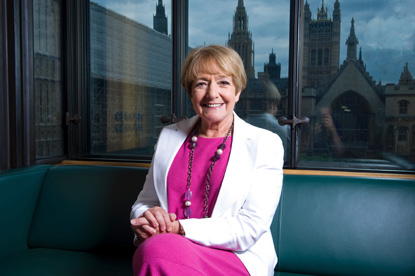By Richard Johnstone | 9 September 2013
The government is yet to make a ‘convincing’ case that the high-speed rail line proposed between London, Birmingham, Manchester and Leeds is the best way to spend public money on transport schemes, Public Accounts Committee chair Margaret Hodge said today.

In an examination of the early planning for High Speed 2, the Public Accounts Committee said figures the Department for Transport had used to justify the line were ‘out-of-date’ and contained ‘fragile’ assumptions.
It is proposed that the ‘Y’ shaped route will open in two stages – from London to Birmingham in 2026, and then onto Manchester and Leeds in 2033, with a total budget of £42.6bn.
However, the committee warned the department did not have enough information about the costs of the line, and accused it of compensating for this by increasing the contingency available. HS2’s total budget has increased by nearly £10bn to £42.6bn for the whole line, of which nearly one-third is intended to cover cost overruns.
‘The programme’s large contingency appears to be compensating for weak cost information,’ the report stated.
Instead, the department should allocate contingency to specific risks to the programme. This way, it would be able to justify the large amount it has set aside.
MPs said they were also concerned the estimated economic benefits had gone down as the budget has been revised up. A National Audit Office report stated the cost-benefit analysis had fallen from £2.60 of economic benefit for every £1 spent in March 2010 to £1.40 for every £1 in August 2012.
Even this estimate could still be incorrect, MPs said, as it was based on information that was more than a decade old, and assumed business travellers cannot and do not work on trains using modern technology. Furthermore, the business case does not include a complete cost for the impact of disruption, for example, to local businesses during construction.
Committee chair Margaret Hodge said it had not yet been demonstrated ‘that this is the best way to spend £50bn on rail investment in these constrained times’.
She added the committee was concerned that the timescale for the scheme to be approved by parliament was ‘ambitious’. Ministers want to have the legislation for the construction of the line passed by the end of March 2015.
Such a deadline is ‘unrealistic’, Hodge said. ‘The timetable is much tighter than for either High Speed 1 or Crossrail, despite the fact High Speed 2 is a much larger programme.
‘In my committee’s experience, not allowing enough time for preparation undermines projects from the start. A rushed approach contributed to the failure of the InterCity West Coast franchise award.’
Responding to the report, transport secretary Patrick McLoughlin said he did not accept the PAC’s conclusions.
'The case for HS2 is absolutely clear: without it, the key rail routes connecting London, the Midlands and the North will be overwhelmed,' he said. 'The project will free up vital space on our railways for passengers and freight, generate hundreds of thousands of jobs and deliver better connections between our towns and cities.
'This government is investing record amounts across our transport network – trebling spending on major road schemes and funding the biggest upgrade to our railway in modern times. HS2 is a vital part of our plan to give Britain the transport infrastructure it needs to compete.'





















